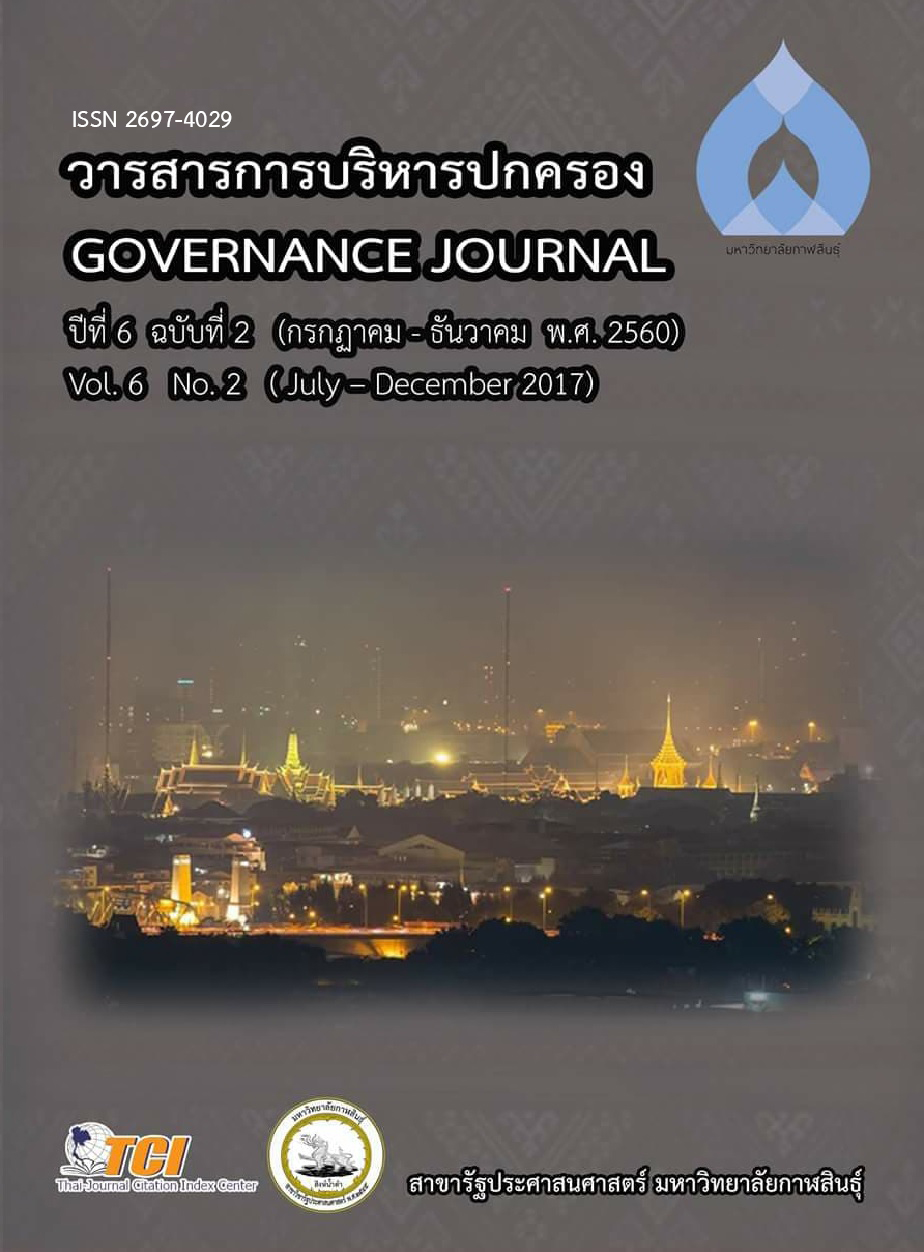การศึกษาผลกระทบของวันหยุดทำการต่อการซื้อขายในตลาดหลักทรัพย์แห่งประเทศไทยระหว่างเดือนมกราคม 2535-เดือนสิงหาคม 2556
DOI:
https://doi.org/10.14456/gjl.2017.35คำสำคัญ:
ตลาดหลักทรัพย์; ผลกระทบของวันหยุดทำการ; ประเภทของนักลงทุนบทคัดย่อ
การวิจัยครั้งนี้มีวัตถุประสงค์ 1) เพื่อศึกษาถึงผลกระทบในวันหยุดทำการของตลาดหลักทรัพย์แห่งประเทศไทยซึ่งรวมถึงวันหยุดยาวและช่วงสั้นในแต่ละช่วงเวลาของตลาด 2) เพื่อศึกษาถึงรูปแบบพฤติกรรมการซื้อขายของนักลงทุนประเภทต่างๆ โดยเน้นปริมาณการซื้อขายเฉลี่ยต่อวัน การศึกษานี้ใช้วิธีการศึกษาโดยวิธีทำการทดลอง โดยใช้ข้อมูลดัชนีตลาดหลักทรัพย์ประจำวันตั้งแต่วันที่ 1 มกราคม 2535 ถึง วันที่ 31 สิงหาคม 2556 โดยมีวันทำการซื้อขายปกติ 5,026 วัน และวันหยุดเทศกาลก่อนกำหนด 283 วัน ใช้ทั้งการศึกษาเหตุการณ์และวิธีการถดถอย ผลการวิจัย พบว่า ก่อนวันหยุดมีผลต่อดัชนีตลาดหลักทรัพย์ (SET Index) และสามารถสังเกตได้ในช่วงวันหยุดยาวกว่าวันหยุดสั้นๆ นอกจากนี้ยังพบว่าในช่วงก่อนวันหยุดนักลงทุนที่เป็นบริษัทและนักลงทุนต่างชาติเป็นผู้ขายหลักของหุ้นในตลาดหลักทรัพย์แห่งประเทศไทย
Downloads
เอกสารอ้างอิง
Evidence on Possible Causes. Journal of Finance 45(5) : 1611 - 1626.
Cadsby, C. B. and M. Ratner (1992). Turn-of-the-Month and Pre-
Holiday Effects on Stock Returns: Some International Evidence. Journal of Banking and Finance 16(3) : 497 - 509.
Chiyachantana, C. N. (2013). Information Based Trading and Day-of-
the-Week Effect”, Actual Problem of Economics Journal, 2013 : 533-542.
Chiyachantana, C.N., Julaluck, C., & Tanakorn L., (2012). Intraday Price
Discovery in Emerging Equity Market: Analysis of SET50 Index, SET 50 Index Futures and THAIDEX SET50 (TDEX), Journal of Applied Economics Sciences, 2012 : 380-390.
Chiyachantana, C. N., Neeranuch, N., Nareerat, T., & Pakpoom, T.
(2015). The Effect of Information Disclosure on Information Asymmetry”, Investment Management and Financial Innovations Journal, 2015 : 225-234.
Chiyachantana, C. N., Theerawat, P., Nareerat, T., & Anantaporn, W.
(2015). “The Aftermarket Performance of Initial Public Offerings in the Stock Exchange of Thailand”, International Research Journal of Finance and Economics, 2015 : 86-102.
Fields, M. J. (1934). Security Prices and Stock Exchange Holidays in
Relation to Short Selling. Journal of Business 7(3) : 328 - 338.
Olgadd, F. & Alex G.(2011). The Holiday Effect in Central and
Eastern European Financial Markets. Investment Management and Finance Innovations, 8 (4).
Lakonishok, J. & Maberly E. (1990). The Weekend Effect: Trading
Patterns of Individual and Institutional Investors. Journal of Finance 45 (1): 231 - 243.
Yang, L., Jeremy, G., & Chiraphol, C. (2016).Valuation Uncertainty,
Market Sentiment and the Informativeness of Institutional Trades, Journal of Banking and Finance, 2016: 81-98.
McGuinness, P. B. (2005). A Re-Examination of the Holiday Effect in
Stock Return: the Case of Hong Kong. Applied Financial Economics, 2005 : 1107-1123.
Vicente, M. & Pardo, A. (2003). Pre-Holiday Effect, Large Trades and
Small Investor Behavior. The Journal of Empirical Finance, 11: 231-246.
Taechapiroontong, N., Charlie, C., Chiraphol N. C, & Radchda, L.
(2014). The Effectiveness of Trading Halts and Investor Trading Performance: An Intraday Analysis on the Stock Exchange of Thailand, International Research Journal of Finance and Economics, 2014 : 191-209.
ดาวน์โหลด
เผยแพร่แล้ว
รูปแบบการอ้างอิง
ฉบับ
ประเภทบทความ
สัญญาอนุญาต

อนุญาตภายใต้เงื่อนไข Creative Commons Attribution-NonCommercial-NoDerivatives 4.0 International License.








